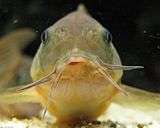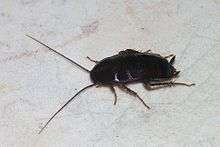ūsa
Latvian

Melnas ūsas (1)
Kaķa ūsas (2)

Zivs ūsas (3)

Prusaka ūsas (3)
Etymology
Borrowed from Old East Slavic усъ (usŭ, “moustache, beard”) (compare Russian усы (usý, “moustache”)). The word apparently entered the language in the 18th century, at first mostly in more Eastern dialects: at the beginning of the 19th century, it was still little known in northern Vidzeme. By the mid-19th century, however, it had become more widely known, albeit with variations (ūse, ūsi, ūsas). The form ūsas became stable only at the end of the 19th century.[1]
Pronunciation
- IPA(key): [ūːsa]
Noun
ūsa f (4th declension)
- (chiefly in the plural) moustache (hair between the nose and the lips)
- melnas ūsas ― black moustache
- kuplas ūsas ― bushy moustache
- audzēt ūsas ― to grow a moustache
- noglaudīt ūsas ― to stroke (one's) moustache
- skrullēt ūsu galus ― to twirl (one's) moustache tips
- (chiefly in the plural) whiskers (hair-like tactile projections on the sides of the upper lip of certain mammals)
- kaķis ar garām, baltām ūsām ― a cat with long, white whiskers
- žurkas purns ar pagarajām ūsām ― a rat's muzzle with extended, long whiskers
- barbels, antennae (hair-like feeler organ on fish, insects, etc.)
- sams sāka peldēt: liela galva, garās ūsas, tumša mugura ― the catfish started swimming: big head, long barbels, dark back
- ja prusakiem tiek zaudēta kāja vai ūsa, kukainis to spēj ataudzēt ― if cockroaches lose a leg or an antenna, the insect can regenerate it, grow it again
Usage notes
Even though the singular forms do exist and are occasionally found (especially in the “insect antenna” sense), the plural forms are much more frequent.
Declension
References
- Karulis, Konstantīns (1992), “ūsa”, in Latviešu Etimoloģijas Vārdnīca (in Latvian), Rīga: AVOTS, →ISBN
This article is issued from
Wiktionary.
The text is licensed under Creative
Commons - Attribution - Sharealike.
Additional terms may apply for the media files.